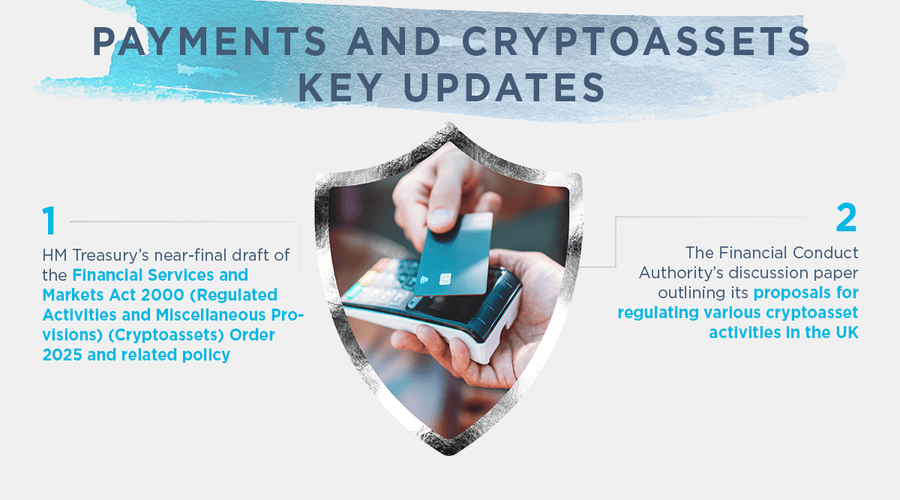UK regulatory regime for cryptoassets
The long-awaited draft framework for the intended UK regulatory regime for cryptoassets has arrived. On 29 April 2025 HM Treasury (HMT) published a near-final draft of the Financial Services and Markets Act 2000 (Regulated Activities and Miscellaneous Provisions) (Cryptoassets) Order 2025, together with a policy note. This follows the HMT's plans to regulate cryptoasset activities set out in its 2023 consultation paper. This was followed by a formal response from the HMT in October 2023 which confirmed the then government's intention to proceed as proposed in the consultation.
Overview of the SI
The draft Statutory Instrument (SI) sets out the changes needed to the law and paves the way for the FCA to make detailed, relevant directions and provide guidance.
It pertains only to the new regulated activities to be created under the Financial Services and Markets Act 2000 (Regulated Activities) Order 2001 (RAO), and their associated consequential amendments to other instruments such as existing anti-money laundering, e-money regulations and financial promotions requirements for cryptoasset firms. The planned market abuse and admissions and disclosures provisions will be published in due course.
Specifically, these draft provisions amend the RAO to —
- Define “qualifying cryptoassets” and “qualifying stablecoin”, as the principal classes of cryptoassets to which the amendments apply;
- Classify “qualifying cryptoassets” and “qualifying stablecoin” as specified investments under the Financial Services and Markets Act 2000 (FSMA); and
- Specify certain activities related to these assets as regulated activities, such that persons carrying on those activities need to be authorised for that activity by the FCA. There are seven new regulated activities that are being created which are dependant on the categories of cryptoassets (e.g. the issuance activity only applies in respect of qualifying stablecoins).
The new definitions work like Russian dolls, i.e., the broadest “cryptoasset” under FSMA will include two sub-categories: (i) qualifying cryptoassets (which includes “qualifying stablecoins”) and (ii) specified investment crypto assets.
The SI sets a clear distinction between qualifying stablecoin and tokenised deposits, and electronic money, through an amendment to the Electronic Money Regulations 2011.
The SI also makes the following changes:
- Amend FSMA as a consequence of the RAO amendments, in particular to set the geographic perimeter for the new regulated activities;
- Amend the Financial Services and Markets Act 2000 (Financial Promotion) Order 2005 (FPO) to apply FSMA’s regulatory framework to that included in the RAO; and
- Make consequential amendments to the Money Laundering, Terrorist Financing and Transfer of Funds (Information on the Payer) Regulations 2017 (MLRs) to reflect the new regulatory perimeter.
So what does this really mean?
Scope
Cryptoasset firms serving UK retail customers should be authorised in the UK. Specifically:
- firms who will be dealing indirectly or directly with a UK retail customer in either or both- arranging deals in qualifying cryptoassets, dealing in qualifying cryptoassets as agent or as principal and operating a “qualifying cryptoasset trading platform”- will require authorisation in the UK, regardless of whether that firm is based in the UK or overseas.
Firms issuing qualifying stablecoin will be required to be authorised if they are carrying on this activity from an establishment in the UK.
All firms will need to apply for the relevant permissions. There is no “grandfathering” for firms that are currently registered with the FCA under the MLRs. Therefore, these firms will have to apply for authorisation in order to undertake in-scope activities. The FCA will set a period ahead of commencement of the regime where firms can submit advance applications for authorisation or variation of permission applications.
Impact of Payments
The original proposals to bring payments using fiat-backed stablecoins within the scope of the Payment Services Regulations 2017 have been deferred. HMT has clarified that qualifying stablecoins can be used for payments in the UK but will be unregulated for payments for the time being. Peer to peer payments via stablecoin would clearly therefore be out of scope.
However there are potentially areas of uncertainty, for example, if there are any intermediaries involved in stablecoin payments, will those intermediaries be caught by the new regulated activities? Again, as most traditional payment chains involve a payer giving an instruction to a payment service provider to make a payment to a payee, would receiving and acting upon that instruction be within scope of these new regulated activities? Further, holding an account for stablecoins is likely to require custody permissions.
What's next?
The SI has been laid before Parliament for the approval of both Houses. HMT intends to legislate for the new cryptoassets regulatory regime by the end of the year, subject to parliamentary time allowing. HMT sought technical comments on the SI by 23 May 2025. On 27 May 2025, the Financial Markets Law Committee published a letter it has sent to HMT highlighting areas of legal uncertainty relating to the new cryptoassets regulated activities set out in the SI. Therefore, although it appears that the drafting approach and other technical aspects of the SI may change before the final instrument is laid before Parliament, firms should nevertheless start preparing for the changes. They should consider the following:
- Any potential impact on business plans and strategies.
- Impact on group structure and governance.
- Any impact on existing permissions and activities both in the UK and globally.
- Firms will need to review their marketing and custody arrangements.
- The potential need to adjust the direction of existing projects (e.g., UK VASP applications).
FCA proposals for regulating various cryptoasset activities in the UK
On 2 May 2025, the FCA published a related discussion paper (DP25/1) to outline its proposals for regulating various cryptoasset activities in the UK. These activities include trading platforms, intermediation, cryptoasset lending and borrowing, staking and decentralised finance (DeFi). The paper aims to balance consumer protection, market integrity, and innovation while ensuring alignment with international standards.
Key proposals
Cryptoasset trading platforms
The FCA is requiring cryptoasset trading platforms (CATPs) serving UK clients to be authorised, with additional rules for retail access, algorithmic or automated trading, and market-making activity. This builds on the HMT’s proposals above that entities operating a CATP in the UK will need to be authorised.
To maintain UK investors’ access to international liquidity pools and align with the FCA's secondary growth objective, the FCA is proposing that overseas CATPs should have a UK-authorised branch to handle the core matching execution and settlement activities of a trading platform to facilitate access to international liquidity and also a UK subsidiary to handle various client-facing activities.
Intermediation
Intermediaries will be subject to best execution rules, transparency requirements, and restrictions on conflicts of interest, such as prohibiting Payment for Order Flow (PFOF). At a minimum, the FCA is expecting functional separation between the principal trading and client order execution operations of firms.
Cryptoasset lending and borrowing
Operating a cryptoasset lending platform and cryptoasset lending and borrowing will fall under the regulated activities of cryptoasset dealing as principal and arranging. The FCA proposes specific rules for these business models given their risks and to ensure mitigation and effective oversight. The FCA also proposes restricting cryptoasset lending and borrowing products for retail consumers in their current form, while exploring measures like creditworthiness assessments and limits on collateral top-ups to mitigate risks.
Use of credit to purchase cryptoassets
The FCA is also considering restrictions on using credit to purchase cryptoassets, citing concerns about unsustainable debt and financial harm. An exemption for qualifying stablecoins is proposed in some cases, such as qualifying stablecoins issued by an FCA authorised stablecoin issuer will likely be exempt from any potential restrictions.
Staking and DeFi activities
For staking, firms would need to improve consumer understanding, safeguard assets, and absorb losses from technological failures.
Genuine decentralised finance (DeFi) activities will not be covered by the future regime. However, DeFi services with identifiable controlling entities would be regulated similarly to centralised services.
What's next?
The FCA invites feedback from stakeholders by 13 June 2025, with a view to developing a robust regulatory framework that addresses the risks and challenges associated with cryptoassets.
Stakeholders are encouraged to provide feedback on the potential costs, benefits, and market impacts of these proposals. Following the consultation, the FCA will publish further guidance and draft rules to refine the regulatory framework. Now is the time for firms to engage with the FCA to better tailor the regime with existing crypto business models before the regulatory framework is finalised.
Concluding remarks and further publications
On 28 May 2025 the FCA further published two consultation papers on proposed conduct and prudential requirements for firms carrying on the regulated activities of issuing qualifying stablecoins and safeguarding qualifying cryptoassets including qualifying stablecoins (CP25/14 and CP25/15). The proposed requirements for issuers set out in CP25/14 are designed to ensure issuers have the right resources, processes and controls in place to promote the stability, transparency and reliability of qualifying stablecoins. The proposed requirements for the custody of cryptoassets are designed to ensure adequate protection of clients' cryptoassets where a qualifying cryptoasset custodian is responsible for them, and that the assets are returned as quickly and wholly as possible to clients if a custodian enters into insolvency.
We are monitoring these developments closely and will publish a series of bitesize insights on these consultations on our website in the coming weeks. We will also be publishing client briefings on the broader Digital Assets regime as and when further papers are published on the regime.









